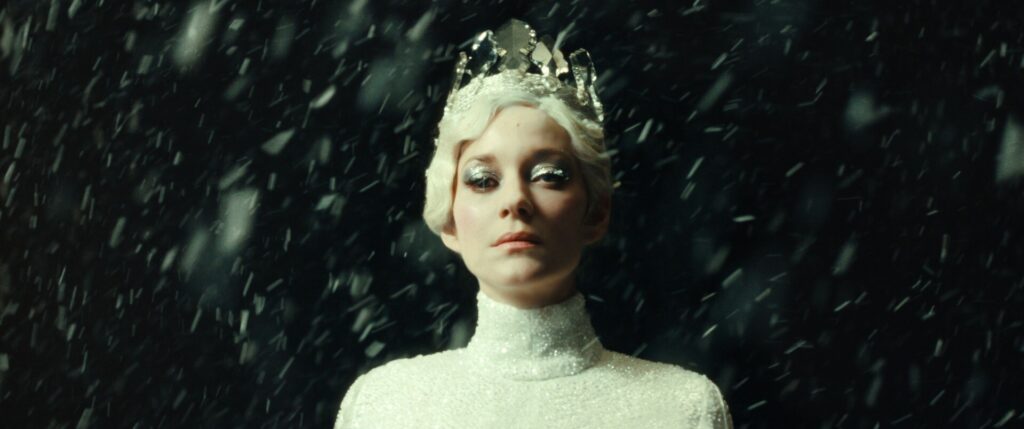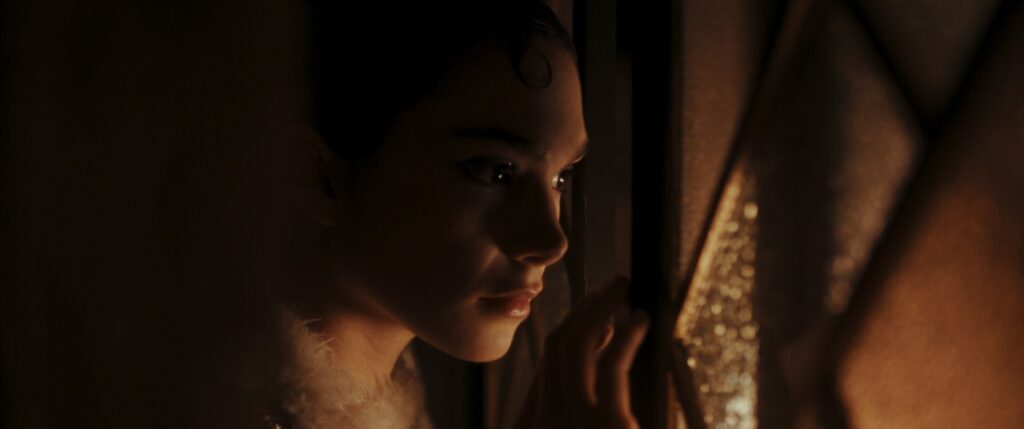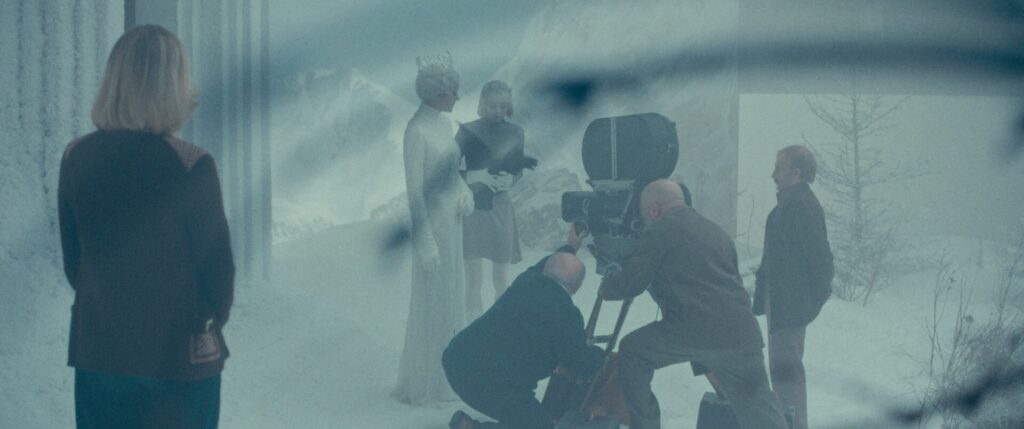Director: Lucile Hadžihalilović
Writers: Geoff Cox, Lucile Hadžihalilović, Alante Kavaite
Stars: Marion Cotillard, Gaspar Noé, August Diehl
Synopsis: Jeanne, a 15-year-old orphan, witnesses the shoot for a film adaptation of the fairy tale The Snow Queen, and she becomes fascinated by its star, Cristina, an actress who is just as mysterious and alluring as the Queen she is playing.
One director who deserves more attention and love for her curation of elemental and dream-like cinema is Lucile Hadžihalilović. Starting her career as an editor, working primarily with provocateur and rabble-rouser Gaspar Noé (who is her husband) on films like I Stand Alone and Carne, Hadžihalilović has spent most of her career in the shadows, from which her work is born and caressed in, gaining light and love from the care and gentleness that the French director gives to them. Her surrealist touch takes the viewer on a journey of finely curated images that seem conjured from her dreams and nightmares–the two intertwining to create a hypnotizing atmosphere and slow-burning, gloomy tone. Few directors like her always take viewers into different ventures each time they present a film. And Hadžihalilović has provided some of the most unique in French cinema in the past couple of decades with films like Evolution (2015) and Innocence (2004).
In an interview with Lucile Hadžihalilović for the Guardian following the release of Earwig back in 2022, film director and writer Mark Cousins asked if she would’ve preferred to have been directed in the silent era. Hadžihalilović replies, “There was a faith in the power of the images, an intensity and often poetry in silent film that is wonderful and that we have lost.” “Silent films can be really close to the language of dreams”, she continued. There used to be a magical sensation upon each image that went through the sprocket. The wonder of cinema is not far from being gone. But the films from the silent era and golden age indeed had imagery and sequences that felt dream-like and ultra-realistic, easily perceived in your sleep and daily life.
The lack of sound made viewers rely on visual storytelling rather than articulated phrasings and dialogues, allowing emotions and narrative to be conveyed through composition and minute details in the performances. Gestures, shadows, lighting, movement, and much more were at the forefront of the picture, where a subconscious discussion occurred between the director and the viewer. That’s what happens with Hadžihalilović’s films. They convey more with the images themselves rather than the dialogue per se. She taps into our indescribable visions at night during our slumber and creates cinematic parables about innocence and transformation. Her latest project, The Ice Tower (La tour de glace, screening in competition at the 2025 Berlin International Film Festival), is no different. Casting a spell onto the audience, Hadžihalilović once again puts you in a trance, guiding you into a story of yearning and social indoctrination between reality and fantasy.
Utilizing Hans Christian Anderson’s fairy tale ‘The Snow Queen’ as inspiration for the constant shift between reality and fantasy, The Ice Tower follows teenager Jeanne (Clara Pacini), the eldest girl in the foster home in a tiny, icy village in 1970s France. On one fine morning, Jeanne escapes the foster home to go to the big city–the way many other fairy tales have begun. (Alice, bored by a riverbank, finds an escape from her rudimentary life via a rabbit hole that sends her to Wonderland; Peter Pan takes Wendy and her brothers away from their draining home to Neverland.) One of the first things that happens to Jeanne is being adopted briefly by a group of teenage girls at a local ice rink.
Jeanne sees something in Bianca, the group’s leader—free-spiritedness and exuberance, qualities she does not recognize in herself. She then becomes fond of Bianca even though she does not know the girl in the least. She’s attached to her personality since Jeanne has been isolated from the world for most of her life, stuck in a foster home full of abandoned souls. This is why, after this encounter, Jeanne creates a new persona while in her escapist ventures, naming herself “Bianca”. From this point on, Hadžihalilović begins to add Mulholland Drive-like elements of duality, in which reality and fantasy blur with one another. It is not as surrealist as David Lynch would cover it, but the French director does a split between dimensions to elaborate more on female independence and identity.
Using the pseudonym of “Bianca”, Jeanne wanders around for a place to stay as day turns to night. She goes deeper into the rabbit hole and ends up in a place where dreams come to life: a soundstage. Inside, a film crew is working on an adaptation of Hans Christian Anderson’s tale ‘The Snow Queen,’ a frostbitten production where reality and fiction blur. This adaptation stars dive movie star Cristina van den Berg (Marion Cotillard, reuniting with Hadžihalilović for the first time since Innocence in 2004) as the Ice Queen, a figure that is equally mesmerizing as it is malevolent. It is directed by Dino (Gaspar Noé), a filmmaker known for some visceral and confrontative pictures; Hadžihalilović slowly adds more self-referential notes to this already confounding piece.
The allure of cinema is tied with the lead characters’ darkness and melancholy. The soundstage becomes a portal, not just into the world of filmmaking, but into Jeanne’s subconscious–a place where the past, present, and imagined futures collide. The artificial glow of studio lights, the “playing dress-up” effect of the makeup and costumes, and the tangible effects and sets make Jeanne tether between self-discovery and self-destruction. As Bianca, the young girl manages to get a role as an extra in the film and catches the attention of the glamorous European actress–initiating the first steps of a dicey, dual fascination. The two worlds between the film-within-a-film intersect as the allure Cristina and Jeanne/Bianca have for one another increases.
Her perception of Cristina is one centered around erotic allure. Meanwhile, we don’t know what the actress wants with the young girl from the get-go. Does she see herself in her? Is Cristina’s past reflected in Jeanne’s eyes? Hadžihalilović develops this mystery via her usual playful methods of constructing surrealist imagery. The characters in the film slowly drown in this darkness that does not seem to dissipate. The shadows show their sorrows, sense of abandonment, yearning, and fractured identities, primarily Cristina and Jeanne/Bianca’s metaphysical intertwining. As one is graced by the screen and killed after the light immersed from the sprocket fades, the other receives life from the gaze of another, then ought to bask in the gloom.
Throughout the film, Jeanne looks with admiration at women who have an allure or poise that she wants and does not know how to attain, much like the attraction Naomi Watts’ Diane Selwyn has for Laura Harring’s Rita in Mulholland Drive. There is a desire for an escape, a psychological intimacy connected to an illusion, or these characters’ unattainable dreams. Instead of utilizing sexual chemistry and eroticism, Hadžihalilović focuses on the fascination that young girls have with older women who have a certain elegance and slickness to them. Hadžihalilović has her protagonist who, coincidentally looks a bit like Lucile herself (bob-cut and all), experiences the vast land of promises and perils that is to come in her later years as she ages.
It reminds me of Dorothy experiencing and learning more about life through treacherous and lively scenarios in The Wizard of Oz. However, The Ice Tower is much more reliant on the despondency beneath the facade of magnetism. Hence, using a film-within-a-film narrative gadget and self-referential tone breaks the illusion of glamour, revealing the loneliness and uncertainty that lurk beneath. Jeanne/Bianca’s admiration is not wholly passive but more so transformative. The young girl mimics and adopts the bad and good traits of those she idolizes, whether an ice-skating teenager or a prima donna movie star, obscuring what she deems as admiration and self-reinvention. This double-edged sword is a pretty liberating thing for Jeanne. However, at the same time, it is a disorienting one that pulls her deeper into a world full of facades.
In The Wizard of Oz, Dorothy seeks self-discovery within her ventures, crossing the yellow brick road to find herself. Jeanne has a road of her own, yet it is more ambiguous and shaped by longing rather than certainty. This film-within-a-film gadget helps reinforce this thematic thread by accentuating how cinema can be a fragile construction depending on the viewer and the performer. Hadžihalilović uses cinema as an art form for escape and reflection. She utilizes her dreams to forge her stories, although they also reveal some personal afflictions Hadžihalilović might have, even if she does not want them to appear as such. Her latest work shows you that there is an undeniable allure in transformation and breaking of innocence. However, Hadžihalilović also tells you that sadness is amidst it all, even in the most enchanting illusions.
Cinema is a tool to tap into dreams and nightmares, and it is constructed by people who try to capture what was once in their heads briefly. It is enchantment through and through from the moment light leaves through the sprocket. Hadžihalilović takes advantage of her image curation to capture that allure from both sides of the plain: the creators and their creations, the process and the end product, all told through a coming-of-age fairytale about identity, isolation, and remembrance. Perhaps there is something more to it that I’m not catching at the moment. (This often happens when you watch many movies during a short period at film festivals.) But rest assured that The Ice Tower is the type of picture whose images linger for a long while and, somehow, are transmitted into your dreams. We are given the ability to traverse that world again without being at the cinema. It is a weird experience to capture and describe through writing. But that is the magic of Lucile Hadžihalilović’s cinema.








